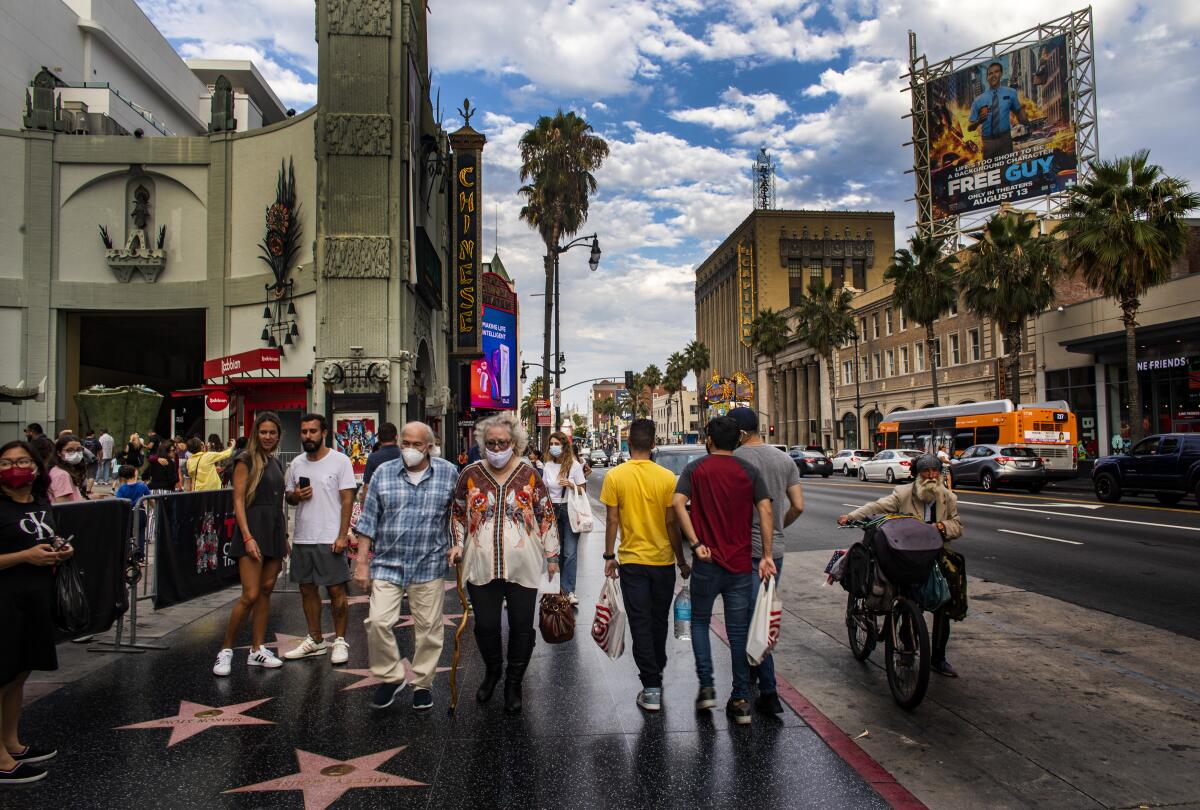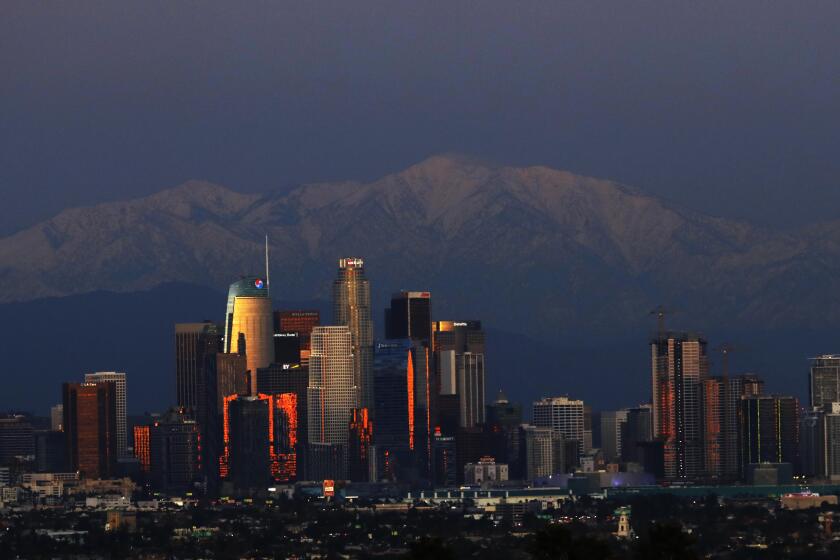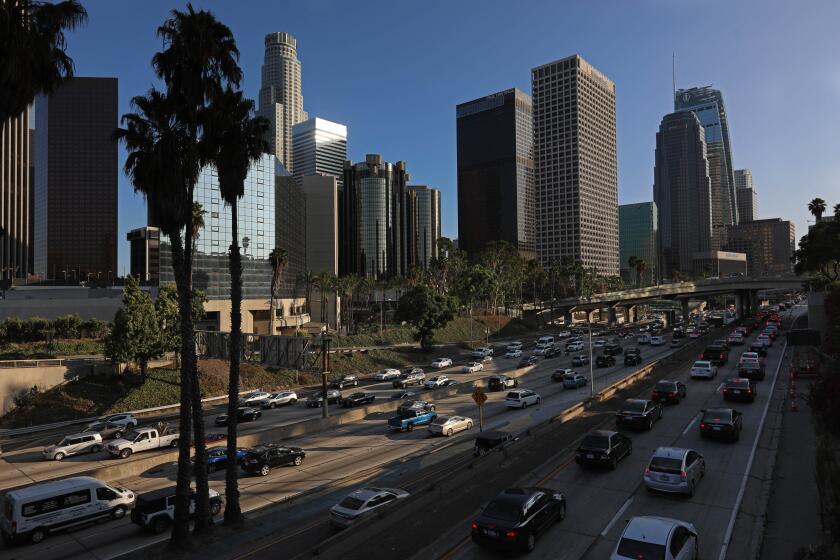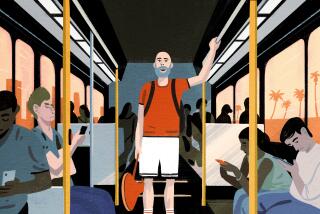‘You’re so L.A.’: What lies behind tourists’ perception of Angelenos

This summer, we began asking readers to submit their most pressing business-related questions about Los Angeles and California.
Then we put the questions to a vote, allowing readers to decide which question we would answer in story form.
Our latest winner was submitted by Blanca Trenado, a lawyer living in West Hollywood: “How do tourists perceive Angelenos? What do we look/feel like to them?”
I love traveling — and happen to write The Times’ Escapes newsletter — so I was particularly excited to dive into this topic. I called Trenado to learn more about why she asked this question.
“I always hear, when I meet people from other places, ‘Oh, that’s such an L.A. thing,’ or ‘Oh, you’re so L.A.,’ but it’s always coming from people who live somewhere else,” Trenado explained.
She heard it at a recent party in L.A. where some of the guests were visitors from New York. One person had to ask a friend to check her phone for her, saying, “I can’t take my gloves off, because of my outfit.” Another in the circle said, “Oh, my God, that’s the most L.A. thing I’ve ever heard.”
“It makes me wonder, do you guys actually experience this in L.A. or [is this a] preconceived notion?” Trenado asked.
In other words, to what degree is the way tourists perceive Angelenos influenced by the expectations they bring with them? Is it even possible to separate the two?
Of course, it’s tricky to talk about “tourists” as a group. “Visitors to L.A. could be people from San Diego County or from Humboldt, or they could be from outside of California altogether or from outside of the U.S.,” said Mechelle Best, the chair of Cal State Northridge’s Department of Recreation and Tourism Management. “Their perceptions of Angelenos may differ because of their own background.”
By the same token, there’s no such thing as a typical Angeleno. “Does it mean somebody who was born and grew up in L.A., or does it mean meet somebody who moved to L.A. last year?” asked Best.
L.A. is a diverse place, home to some of the country’s richest ZIP codes but with a median household income of $62,142 and 18% of the population living below the poverty line. Nearly half of the population identifies in census data as Hispanic or Latino , while Asian residents and Black residents make up 11% and 9% of the population, respectively.
When people like Trenado’s partygoers describe something as “so L.A.,” they tend to have a more specific image in mind. It starts with the lifestyle, seen as ultra health-conscious but also glamorous and trendy, said Don Skeoch, chief marketing officer at Discover Los Angeles, the region’s tourism board.
“They believe that everyone gets up at 6 a.m., and we all have our half-caf soy milk chai latte. And then from 7 to 8, we either go to yoga or Pilates class. Then we work from 9 to 12,” said Skeoch, who explained that Discover Los Angeles has conducted focus groups around the world to learn more about potential visitors to L.A.
“Then at 12 o’clock, we have to race to a power lunch, whatever that is, ... And at 5 o’clock we all are on a rooftop somewhere having a glass of rose and watching the sunset.”
Whatever’s puzzling you about life in L.A. and California, we want to hear about it.
Tied up with that image is a frequent — and off-base — assumption about what the average Angeleno does for a living. “People really expect everybody to be in showbiz in some capacity,” said Dara Mihaly, a general manager with the tour company ExperienceFirst. “When people get to L.A., and we’re actually showing them around the different neighborhoods, and they see how diverse it is, it’s kind of a surprise.”
How tourists engage with the city during their time here can determine whether their experience of Angelenos ends up echoing their expectations. Arriving in town with ideas shaped by TV, movies and social media, many simply “want to live their dream of L.A.,” said Francesca Romana Puggelli, who teaches in the applied psychology graduate program at USC.
People generally want their expectations to be met while visiting a new place. As travelers, we often think, “I’m spending so much money and so much time on planning my vacation .... I’m really pushing myself to see what I planned to see and to live the way I planned to live” while there, Puggelli said.
That’s why, if visitors see Angelenos that don’t fit into their preconceived notion of what people in L.A. are like, they may experience a sense of cognitive dissonance and seek to resolve it by deciding to believe the outliers are simply other travelers or workers who commute into the city, Puggelli said.
Even though some visitors may enjoy seeing their expectations seemingly confirmed, Mihaly says she tries to challenge people’s stereotypes of L.A. during tours. “After spending six hours with someone in the car, representing the city .… They’re like, ‘Wow, you’re a human being who has this full-fledged life outside of wanting to be a celebrity.’”
“If you stay in L.A. more and more, and you meet different people in different areas, you see that L.A. is not the stereotype, it’s so much more than that. It’s much more complex,” Trenado said.
If there’s one impression of Angelenos shared by those visitors who have really taken the time to get to know the city and its people, it may be that they are, as a general rule, relatively easygoing.
“As an outsider, always hearing about the rat race of L.A., I think that might be a little more hyped up than what I had experienced,” said Paige Rockers of Overland Park, Kan., who has visited L.A. several times.
Instead, “Overall, I think people who live in Los Angeles have a pretty laid back attitude,” Rockers said. “I think that could partially be due to things like the traffic that [Angelenos] always have to deal with.”
When I conducted an extremely unscientific poll of my friends, this characteristically chill demeanor was the quality they brought up most often.
“Everyone was very kind, just kind of laid-back, kind of ‘You mind your business, I’ll mind mine,’” said New Jersey resident Caitlin Duffy, calling L.A. a “vast, varied, beautiful experience.”
We picked our favorite questions — now you get to choose which question we answer first.
So, we’re known for being relaxed — but the jury’s still out on whether we’re as warm as our famously balmy weather. “Before I visited recently, someone sent me a tweet that said the difference between New Yorkers and Angelenos is that New Yorkers are kind, but not nice. And Angelenos are nice, but not kind,” Meaghan Coffey of New York City said. While she agrees that Angelenos tend to be more welcoming and friendly on first meeting, she feels that kindness is “impossible to parse out during a two-week visit.”
Long story short, Trenado’s suspicion is mostly right: When tourists feel like everyone they meet in L.A. is “so L.A.,” it’s probably because they’re seeing us through the lens of the preconceptions they brought with them. But that’s fine. We Angelenos are (mostly) chill about it.
Do you have a pressing question about L.A. and California? Ask us here.









